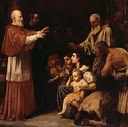The Catholic Counter Reformation - Futurism
The Jesuits were commissioned by the Pope to develop a new interpretation of Scripture that would counteract the Protestant application of the Bible’s prophecies regarding the Antichrist to the Roman Catholic Church. All the reformers’ studies pointed the finger directly at the Roman Catholic Church as the Antichrist power described in Daniel as the “little horn.”

Francisco Ribera (1537-1591), a brilliant Jesuit priest and doctor of theology from Spain, answered Papacy’s call. Like Martin Luther, Francisco Ribera also read by candlelight the prophecies about the Antichrist, the little horn, the man of sin, and the beast of Revelation.
He then developed the doctrine of futurism. His explanation was that the prophecies apply only to a single sinister man who will arise up at the end of time. Rome quickly adopted this viewpoint as the Church’s official position on the Antichrist.
In 1590 Ribera published a commentary on the Revelation as a counter interpretation to the prevailing view among Protestants which identified the Papacy with the Antichrist. Ribera applied all of Revelation to the end time rather than to the history of the church. Antichrist, he taught, would be a single evil person who would be received by the Jews and who would rebuild Jerusalem.i
Ribera denied the Protestant Scriptural Antichrist (2 Thessalonians 2) as seated in the church of God-asserted by Augustine, Jerome, Luther, and many reformers. He set on an infidel Antichrist, outside the church of God.ii
The result of [Ribera’s] work was a twisting and maligning of prophetic truth.iii
Following close behind Francisco Ribera was another brilliant Jesuit scholar, Cardinal Robert Bellarmine of Rome (1542-1621). Between 1581-1593, Cardinal Bellarmine agreed with Ribera in his work Polemic Lectures Concerning the Disputed points of the Christian Belief Against the Heretics of this Time.
The futurist teachings of Ribera were further popularized by an Italian cardinal and the most renowned Jesuit controversialists. His writings claimed that Paul, Daniel, and John had nothing whatsoever to say about the Papal power. The futurists’ school won general acceptance among Catholics. They were taught that antichrist was a single individual who would not rule until the very end of time.iv
Through the work of these two clever Jesuit scholars, Jesuit futurism was born.